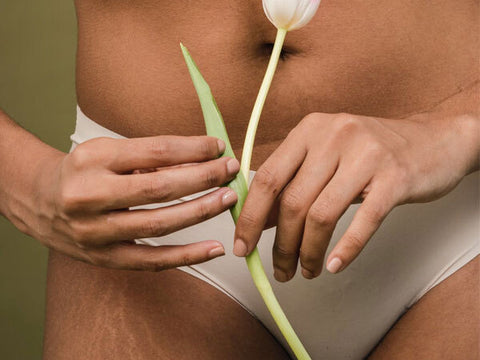How Does Your Pee Come Out?

Looking at how your pee comes out can tell you a lot about your pelvic floor. We want to encourage more of you to look at your vulva and understand your body to improve your intimate health.
A recent survey among our community where1200 people took part, showed 75% of you have a look at your pee - well done!
Let’s take a closer look: Does your pee come out straight? Twisted? As a spurt? In drops? Does it change depending on your position or on shaving/not shaving?
Normally, your pee should come out in a constant, straight flow, without pushing. In the end, you should have the feeling that your bladder is empty. If something’s not right, welcome to the club; 63% of our community said their pee is not straight.

One of the main reasons why your pee comes out like this, is because you may have a small contracture involving your pelvic floor. If this is the first time you are hearing about the “pelvic floor” or wondering how your pee affects it, then please read our articles on this topic.
If your pee does not come out straight, don’t panic - I’d suggest that you go and see a specialist. A small contracture can develop into more serious issues. In most cases, getting a pelvic floor evaluation and some rehabilitation, can help you to relax your muscles and be more aware of your own pelvic floor.
If, when sitting on the toilet, with a small bench under your feet to raise your legs and without pushing (this is the correct way to pee), your pee doesn’t come out straight (it’s totally twisted, maybe it touches your thighs), spurts everywhere, comes in drops or with difficulty, there’s a contracture.

Sometimes certain situations can influence the behaviour of your pee, such as standing whilst using a public toilet; standing doesn’t help relax your pelvic floor so your pee will come out “more twisted” than usual.
In some cases, having a wrong menstrual cup or having a cup inserted incorrectly could push on your bladder, causing pee to spurt out. Neither a bigger or smaller labia can influence the spurt.
The feeling of not being empty, heaviness or finding drops of pee on your underwear after peeing, are warning signs that something’s not right with your pelvic floor and it’s time to get it checked.

Our survey showed 65% of our community found when they clean shave, the behaviour gets worse. Let’s debunk this myth: our midwife, Rita Anna di Molfetta says, "Pubic hair has nothing to do with it. Hair will only 'mask' the contracture but, once it’s gone, we can simply see the contracture more clearly."
So the next time you visit the bathroom, remember to always use a small bench to raise your leg and not to hold your pee for too long. Holding your pee on a regular basis can increase the risk of UTIs or other complications.



